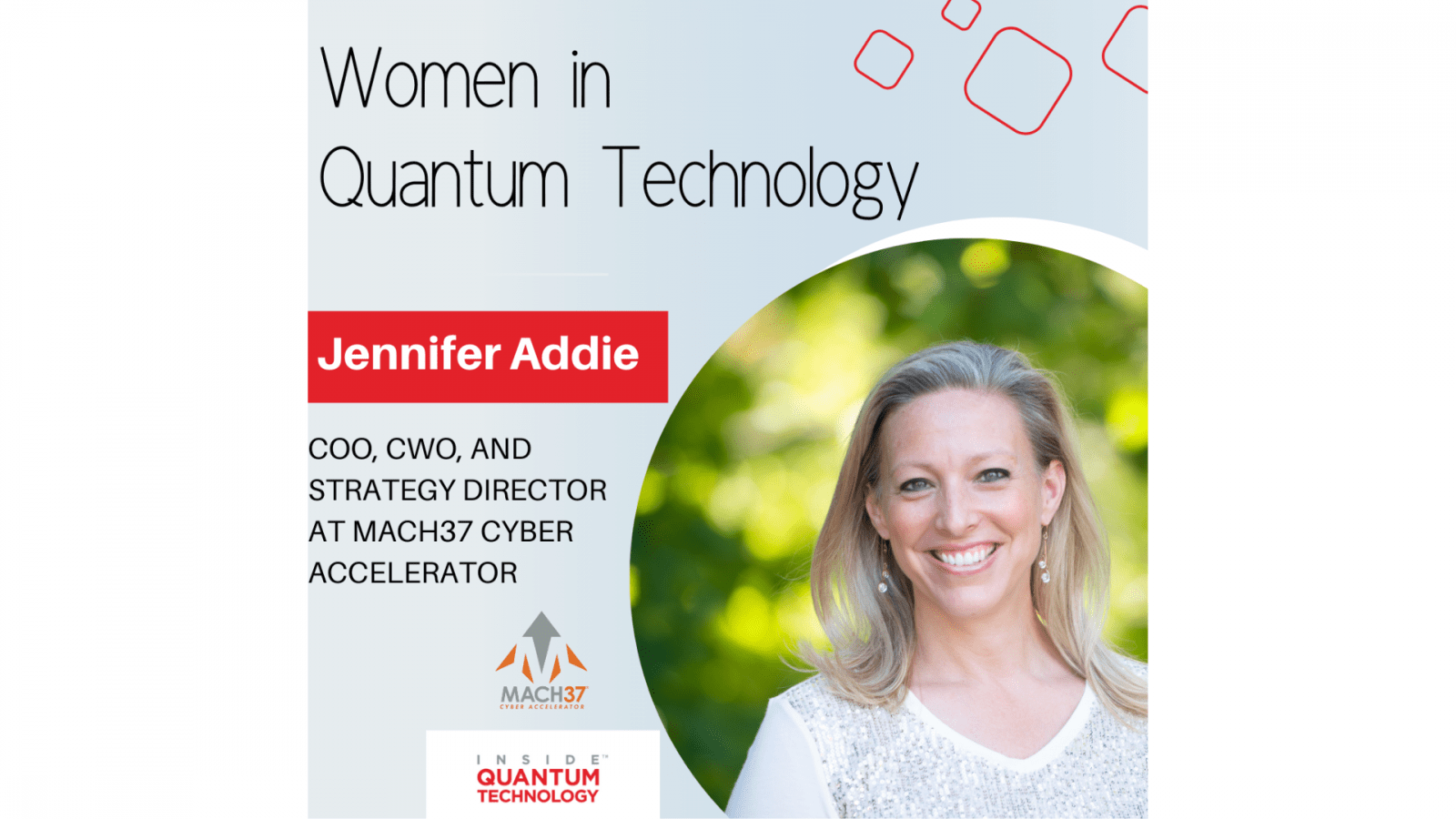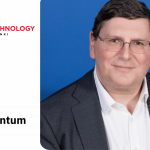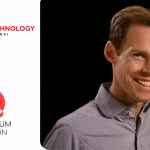Women of Quantum Technology: Jennifer Addie of MACH37

Few figures in quantum technology and cybersecurity combine these fields as much as Jennifer Addie, the COO, CWO, and Strategy Director at MACH37 Cyber Accelerator. Her journey into the quantum space is not just a tale of career advancement but a lifelong passion for understanding the universe’s complexities. “When I was a kid, I was into neuroscience, and I studied cognitive science in an interdisciplinary fashion while in college,” Addie told Inside Quantum Technology. “And then I realized how much we didn’t know about the world around us and the physical sciences. The decade of the brain in the 90s highlighted that we knew so little about our own minds and bodies, and each new discovery we had indicated how much more might be out there, which felt exciting from an exploratory standpoint.”
Here, Addie first encountered quantum concepts at 17 while studying consciousness, igniting a spark that would guide her future career. Her initiatives to create an independent research course for her high school emphasizing deeper cutting-edge scientific research and a chaos and complexity theory class as a 20-year-old at the University of Virginia exemplify her proactive and interdisciplinary approach to learning and exploration.
The transition to a computing, analytical, and product development career seemed natural for Addie, given her interest in high-power computing and the burgeoning internet. However, her work with startups, particularly in cyber, data science, and product development, positioned her at the forefront of cybersecurity and quantum technology. After working for years with emerging technologies, accelerators, and tech startups, she was invited, alongside MACH37 CEO Jason Chen, by the Center for Innovative Technology in Virginia to lead the MACH37 accelerator, further deepening her engagement with cutting-edge technologies and positioning her to help influence the discovery and nurturing of promising companies bringing that tech to market.
As Addie remembered: “We were excited to come in and serve as the new operating team. We watched, listened, and connected broadly with all different ecosystem members to learn what needs and horizons we may want to pivot the accelerator to support. And the next year, we started the purchase to acquire it. We made the deliberate decision to jump way deeper into cyber, quantum, AI, space and other emerging and deep tech as a result.”
Under her leadership, MACH37 has expanded its focus beyond traditional cybersecurity, recognizing the transformative potential of quantum technology across various sectors, including cyber, finance, infrastructure, communications, healthcare, and manufacturing. MACH37 has been paying attention to what’s happening within the quantum research community and how that plays out in early-stage companies, from what problems they choose to solve using quantum technologies to what products they can most feasibly design and implement and what talent they are using. Addie’s strategic vision emphasizes the importance of understanding the market landscape, how market segmentation evolves, and where funding is going and why.
MACH37 utilizes its tech scouting capabilities to develop comprehensive reports that assess the impact of emerging technologies on diverse industries and inform their strategic business decisions. Addie noted that deep tech like quantum, which takes longer to develop than other innovations, requires a more holistic multi-factor approach to hypothesizing various futures.
“A lot of quantum technologies will be critical for cybersecurity, as they have incredible applications for enabling encryption/decryption, system orchestration, software development, product engineering, and generally producing ‘quantum proof’ solutions,” she added. “Of course, one of the greatest concerns is what the post-quantum age will entail, from security to data rights and privacy law. Future scenarios and the level of disruption that quantum capabilities might bring come up a lot in our work at MACH37.”
Some unfamiliar with accelerators are curious about their role and value to emerging technologies, such as those in quantum computing. “Accelerators like MACH37 function to discover the best tech and teams who can help build the future, as well as assemble the larger community to validate, support, and develop them in ways that benefit each of the stakeholders and the larger market,” Addie explained. “This is especially important for advanced technologies where fewer people are familiar with the tech, and thus sometimes feel less comfortable adopting it or even spending the cycles anticipating all the ways they might be applied. MACH37 works to help the community understand the value of new technologies and serve as champions to enable the tech transition from research and development to market adoption. The accelerator’s community helps to de-risk the business ventures who are applying the technology in new ways. It connects them to potential venture investors, channel partners, talent and mentors who can help them survive long enough to scale and bring the impact they’ve envisioned since the beginning.”
Under Addie’s stewardship, VentureScope (MACH37’s parent company where Addie also serves as COO) and MACH37 have become pivotal in accelerating and supporting early-stage startups and advising larger corporate and government clients on emerging technologies, market trends, and innovation strategy. A portion of the innovation strategy work VentureScope does centers on preparing organizations for emerging technologies and deep tech breakthroughs. The impact and application of quantum capabilities specifically come up frequently. They help organizations understand the core technologies, become familiar with the industry landscape, follow trends and breakthroughs more actively, and integrate that understanding into strategic impact assessments that empower them to plan and run internal operations in ways that help protect against massive disruption as well as proactively innovate ways to navigate the changes the new technologies bring and utilize new capabilities to their advantage.
With this, their MACH37 approach transcends the conventional accelerator model, focusing on connecting more deeply to the market to reach true product-market fit and enabling startups to articulate their value propositions effectively. This commitment to fostering innovation is also evident in her work helping to design, stand up, and run the Refinery, U.S. Air Force’s internal accelerator, which empowers Airmen innovators to solve unique DoD challenges by applying startup approaches, research-based innovation methodologies, and emerging technologies.
“We’re now scaling MACH37 into the Netherlands to expand our presence and connectivity across Europe. We aim to develop stronger networks to sense and advocate for their technical and scientific breakthroughs, which have important impacts on the global cyber ecosystem,” she added.
Addie’s leadership as COO of MACH37 and VentureScope extends beyond her executive roles. She is deeply involved in teaching, consulting, and investing in the future of technology. Her dedication to bridging gaps across industries, geographies, and public-private sectors underscores her belief in the power of collaboration and innovation.
As a prominent female technology leader, Addie is aware of the challenges and opportunities in promoting diversity within quantum computing and cybersecurity. She advocates for a change in the narrative around technology careers, encouraging women and other underrepresented groups to view tech as a dynamic and accessible field.
“Most people I work with never would have known they were going to choose the path that they did,” Addie said. “And I think that can be intimidating because when you’re approaching technology, it’s hard to know exactly where you want to end up. And you don’t know what you don’t know. So I think it is important to approach it more like a journey and an exploration, actively choosing what speaks to you and might offer inspiration and impact.”
Addie believes the tech industry can become more inclusive and innovative by emphasizing education, mentorship, and the value of diverse experiences.
“There’s also incredible value in helping folks who didn’t grow up with this digital acumen, who didn’t have an iPad in their hand from age two, to approach some of these concepts in a way that matters to their lives,” added Addie. “Many folks don’t want to know something to know something, but if it’s connected to their life and something that matters to them, then it makes sense, and it’s worth spending time on. We’re all in this together, and the more we can connect as humans, the more it aids in crossing the conceptual and technological bridges we all need to remain functional, safe, and thriving in modern society.”
Kenna Hughes-Castleberry is the Managing Editor at Inside Quantum Technology and the Science Communicator at JILA (a partnership between the University of Colorado Boulder and NIST). Her writing beats include deep tech, quantum computing, and AI. Her work has been featured in National Geographic, Scientific American, Discover Magazine, New Scientist, Ars Technica, and more.



















